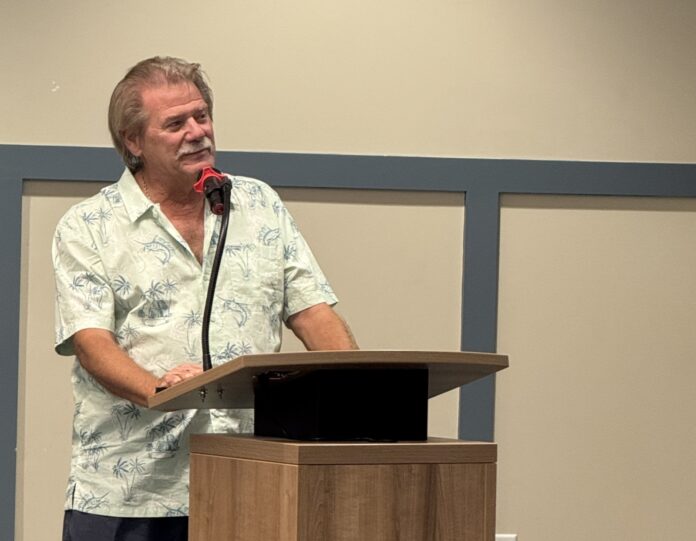
Citing the threat of takings cases in a city that has nearly exhausted every building allocation it has left, the Marathon City Council elected to request a change to the state statutes governing the number of building rights in the Keys at its Dec. 10 session.
Resolution 2024-125, unanimously approved on Tuesday night, requests changes to the laws governing the Florida Keys as an Area of Critical State Concern, the most consequential of which would increase the required hurricane evacuation clearance time for permanent residents from 24 to 26 hours.
Though city officials repeatedly stressed that the resolution centered around a change to evacuation times, recommended language in the resolution also proposes building allocations to be “provided to the (Florida Keys and Key West Areas of Critical State Concern) based upon an assessment that this number approximates the number of vacant buildable residential lots remaining within the Florida Keys.” The allocations would then be proportionally distributed among jurisdictions in relation to the buildable vacant lots in each.
Also contained in the resolution is a suggested requirement to distribute new building units evenly over a minimum 40-year timeline, but that units may be “borrowed forward” from future years if these units go toward the construction of affordable workforce housing.
Public comment on the issue mirrored Marathon’s workshop one week prior, and while some spoke in favor of accepting a minimum number of units while others proposed “as many as we can get,” virtually all urged a slow rate of distribution to allow for appropriate infrastructure upgrades.
“Not a single speaker (last week) stood before you and said ‘no more ROGOs’ and get engaged immediately with a takings lawsuit,” said Ann Olsen, president of the nonprofit environmental advocacy group Keys Last Stand. “All comments from the non-development side said simply, ‘Take the fewest number to avoid liability, or determine what is the fewest number you can dole out per year to avoid takings.’”
Councilman Kenny Matlock raised concern with the “borrow forward” provision, arguing that the city could be hard-pressed to legally deny an opportunity for a landowner with readily available resources to monopolize available affordable workforce units from future years and construct a large multi-family development.
City Manager George Garrett acknowledged that some awarded rights could be preserved exclusively for development of single-family homes or duplexes, but that the concern could be addressed with a future change to Marathon’s land development regulations.
“Communities need all types of housing,” said Vice Mayor Jeff Smith. “To memorialize (the types of units) here to prevent any of those needs being met in your community, I have a problem with that. … We should probably add some single-family in there, but I don’t want to tie the hands of people going forward.”
Smith also voiced support for Monroe County’s pursuit of a new classification of building allocations, currently in development by county staff after requests from the community and commissioners. Given the working title of “workforce market-rate units” in recent meetings, the new units could remove value restrictions commonly tied to affordable housing units in exchange for exclusive ownership by those who live and work in the Keys.
City Attorney Steve Williams reiterated that a request for additional building rights could be critical in securing state assistance for both the defense and cost of future takings cases.
“Traditionally, the state has worked to front some of the defense cost of these cases, up to about 50%,” he said. “If we don’t ask, or if they offer and we say no, when it comes time to defend these, instead of somebody else footing the bill, we’re going to have to write the entire check ourselves. … It’s a check or a unit, your choice.”
“We’re going to have our arguments about how many numbers we request coming up, but (this) request, you almost have no choice,” said Matlock. “Tonight is almost, do we do takings cases or not?”
“What I hear from this council up here is that we are committed to slow growth,” said councilwoman Robyn Still, who pushed with Matlock to extend the timeline from 30 to 40 years for distribution of new units. “We’re committed to making sure that the level of service is in place and infrastructure is in place.”
Building rights requests from Marathon, Islamorada and Key West were set to be considered at the Monroe County BOCC’s Dec. 11 regular meeting, with a final request for rights, if any, to be finalized at a special session on Dec. 19 in Marathon.
Founding councilman Frank Greenman honored
One of Marathon’s first five councilmen will be honored each Nov. 26, thanks to the unanimous passage of Resolution 2024-124. Read by housing coordinator Josh Mothner and later expounded upon by fellow former councilmen John Bartus and Randy Mearns, the resolution dedicates a day of civic service and music appreciation in memory of Frank Greenman, who passed away late last month.
The resolution honors Greenman as “a true teacher at heart” and “tireless crusader for justice” with a “seemingly limitless determination to improve the quality of life for everyone in the city of Marathon.”
“He was part of the original crew who put (Marathon) together. Through the good ideas and crazy ideas, it was Frank and Bob Miller who led us down the straight path and made this happen,” said Mearns. “We are all indebted to him.”
In other news:
- Resolution 2024-127, unanimously approved, awarded a $4.87 million contract to Charley Toppino & Sons Inc. for construction of the upcoming new drainage system on a constantly-flooded Sombrero Boulevard.
- Resolution 2024-129, also unanimously approved, awarded Water Science Associates LLC with a $2.83 million contract for design, permitting and construction engineering services for Marathon’s upcoming deep wastewater injection well.

















